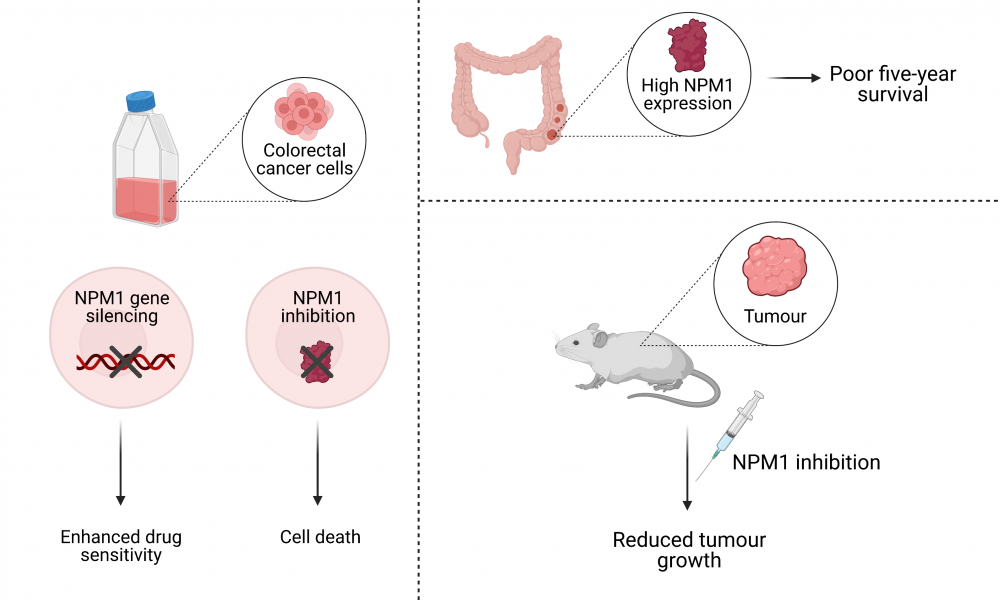
With an average of 73 Canadians being diagnosed with colorectal cancer every day, the disease is the second leading cause of cancer death in men and the third in women. Reducing colorectal cancer fatalities will require better knowledge of the disease and the development of novel treatment and screening strategies—endeavors that are currently being undertaken by GSC Senior Scientist Dr. Isabella Tai.
In a new study published in the journal Cancer Biology & Therapy, Dr. Tai’s research group characterized the involvement of a multi-functional protein, called NPM1, in colorectal cancer growth and treatment resistance, providing the research community with a potential therapeutic target for the treatment of the disease.
NPM1 regulates a diverse array of cellular functions, and genomic alterations that affect the activity of NPM1 have been implicated in various cancer types. Increased expression of the protein has been observed in liver, thyroid, colorectal, bladder and prostate cancers.
In the study, researchers analyzed NPM1 expression levels in colorectal cancer tissues and found that high expression correlated with reduced overall survival, a finding that was particularly apparent for patients with late-stage disease. These findings indicate that NPM1 plays a role in the progression of colorectal cancer and suggest that the protein may be a therapeutic target.
To ascertain the molecular mechanisms of NPM1 in colorectal cancer, the researchers grew colorectal cancer cells in the laboratory and studied the effect of altering NPM1 expression and activity. Silencing the NPM1 gene made the cells more sensitive to chemotherapy while blocking NPM1 activity resulted in enhanced cancer cell death.
These findings were validated by growing human colorectal cancer tumours in mice. They found that inhibition of NPM1 resulted in reduced tumour growth while high NPM1 expression led to progressively larger tumour volumes over time, further demonstrating its therapeutic potential. The group was further able to demonstrate that NPM1 works in concert with a pro-survival protein called Akt, and that by blocking Akt activity, the sensitivity of cancer cells to treatment with chemotherapy can be restored.
“This study demonstrates that NPM1, acting in concert with other well-characterized signaling pathways, is involved in the progression of colorectal cancer,” says Dr. Tai. “Our hope is that it provides an avenue for further investigation into the therapeutic potential of NPM1 and its downstream effectors and ultimately leads to improved treatment options for colorectal cancer patients.”
Angel C.Y. Yu , Yi-Jye Chern , Peter Zhang , Clarissa C. Pasiliao , Mahbuba Rahman , George Chang , Jianhua Ren & Isabella T. Tai (2021): Inhibition of nucleophosmin 1 suppresses colorectal cancer tumor growth of patient -derived xenografts via activation of p53 and inhibition of AKT, Cancer Biology & Therapy. DOI: 10.1080/15384047.2020.1839278.
This work was supported by operating grants from the Canadian Institutes of Health Research.
Learn more about research in the Tai Lab.
Learn more about research at the GSC.